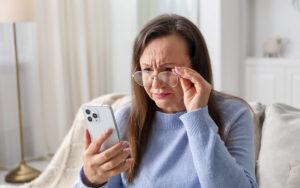You can get herpes in your eyes! It sounds made up, but ocular or eye, herpes is a condition caused by the Herpes Simplex Virus (HSV). It is a potentially serious infection that affects about 1.5 million people globally each year. It is also a significant cause of infectious blindness in the USA and Canada.
Patients who develop ocular herpes could experience vision loss and blindness without proper treatment. Moreover, the symptoms make it hard to contribute to society while affecting social life.
Below you will find resourceful information outlining the causes, symptoms, and treatments options for ocular herpes.
Causes of Eye Herpes
Ocular herpes is caused by transmitting the herpes simplex virus (HSV) to the eye. It could happen to anyone since at least 90 percent of adults are exposed to HSV-1 by the time they turn 50. This virus affects parts of the eye, including the eyelids, cornea, retina, and conjunctiva.
It is important to note that, unlike genital herpes, eye herpes is not sexually transmitted. Instead, it commonly happens through the mouth in the form of cold sores. If you come in contact with the cold sores of an infected person, you will likely get the virus.
In addition, once you get the virus, you cannot eradicate it from your body. Instead, it lies dormant and can flare up every once in a while. Therefore, eye herpes can be a reactivation of a previous HSV infection. Some of the triggers that cause the dormant virus to reactivate include:
- Stress
- Fever
- Sunburns
- Trauma
- Injury
- Menstruation
- Dental procedures
- Surgical procedures
- Weakened immune system due to illness or medication
Thankfully, the risk of spreading the virus from an infected eye to another person is low.
Types of Ocular Herpes
There are two major types of ocular herpes:
Epithelial Keratitis
This is the most common type of eye herpes, accounting for 50-80 percent of all eye herpes infections. While common, it is not as serious since it only affects the outermost layer of the cornea, the epithelium. This virus will destroy the corneal epithelial cells, growing as it grows.
Stromal Keratitis
This is a more serious type of disease that affects the stroma, or deeper layers of the cornea. Effects of HSV with a weakened immune system cause the viral infection to spread out of control.
Over time, this type of infection causes corneal scarring and vision loss. Stromal keratitis comes in two forms:
- Without ulceration. This occurs when the viral proteins are left behind in the cornea after the infection clears up. The body reacts to the proteins through inflammation, leading to the death of the tissues.
- With ulceration. This is less common than with ulceration and similar since it is an immune response to left-behind proteins. However, instead of inflammation, patients experience tissue necrosis leading to the formation of an open sore and destruction of the stromal bed.
Symptoms of Eye Herpes
Symptoms of eye herpes can be severe or mild depending on the type patients transmit. Additionally, it can affect one or both eyes. Sometimes, the infection can move from eye to eye. However, the most common symptoms include:
- Swollen lymph nodes. You will notice swelling at the front of the ear.
- Irritation. Your eyes will sustain irritation, like something is in your eye.
- Watery discharge. You will notice more tearing.
- Blisters or a rash on the eyelids. They will sometimes feel itchy and painful.
- Sensitivity to light. You will need sunglasses when going outside.
- Headaches. Which can bring a feeling of tiredness and lack of energy.
- Eye redness. You will notice that your eyeball is discolored with a tint of pink to red.
- Eye soreness. You are likely to feel more sleepy because your eyes are sore and tired.
- Inflammation of the eyelids. There will be significant swelling on the eyelids and around the eye with severe pain.
- Blurry vision. With corneal scarring, your vision becomes blurry. Without immediate medical attention, you will lose your vision.
Eye Herpes vs. Conjunctivitis
It is easy to confuse eye herpes for pink eye since they have similar symptoms. However, the two are different. Pink eye, or conjunctivitis, is caused by a bacterial infection, allergies, chemical exposure, or viral infection.
Symptoms of pinkeye include eyelid swelling, redness, pain, and even discharge from the eye. Because the symptoms are so similar, it is best to see an expert when you notice these signs.
A healthcare professional should be able to diagnose you correctly and give you the right medication. Self-diagnosis is never advisable in either case.
Treatment Options
Eye herpes treatment depends on the type, location, and severity of the infection. Common treatments include:
- Topical antivirals. Your doctor will prescribe Zirgan as the first choice of topical treatment. Doctors can also prescribe Viroptic, which is effective but can delay corneal healing due to its toxic properties.
- Oral antiviral medications. They are ideal for treating dendritic epithelial keratitis. They are less expensive and have a more manageable dosing schedule than topical antivirals. They are a first choice of treatment for many patients, but they require many precautions since they cause kidney and liver diseases.
- Corneal epithelial debridement. This treatment involves wiping infected cells off the cornea with a dry cotton application. This treatment removes around 90% of the virus in the eye.
Stromal keratitis infection is treated with oral antivirals plus topical steroids. The steroids will reduce inflammation and prevent corneal scarring. However, they can reactivate the epithelial disease, so topical steroids are necessary to prevent reactivation.
Remember:
Eye herpes does not have a permanent cure. Once you get the virus, it cannot leave your body, but you can manage the symptoms of the disease with medication. Eye herpes symptoms will often clear out in one to three weeks.
You must always finish your dosage, even if the symptoms clear up before your prescribed treatment finishes. Additionally, if your symptoms do not improve with treatment after two weeks, go for a follow-up appointment.




